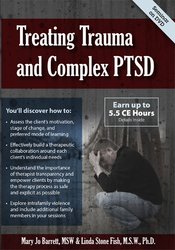Description
When working with trauma cases do you see clients go into flight, fight, and/or freeze? Do they yell at you, insult you, or leave the session? Are there times you find yourself getting angry at your clients? Do you recognize your own flight, fight, and/or freeze response? Welcome to the messy, often confusing world of trauma treatment. In this workshop, you’ll explore practical in-session techniques as well as a framework to help you recognize what’s happening when things heat up and get intense. You’ll discover how to:
- Assess the client’s motivation, stage of change, and preferred mode of learning
- Effectively build a therapeutic collaboration around each client’s individual needs
- Understand the importance of therapist transparency and empower clients by making the therapy process as safe and explicit as possible
- Explore intrafamily violence and include additional family members in your sessions
CPD
CPD
- PESI Australia, in collaboration with PESI in the USA, offers quality online continuing professional development events from the leaders in the field at a standard recognized by professional associations including psychology, social work, occupational therapy, alcohol and drug professionals, counselling and psychotherapy. On completion of the training, a Professional Development Certificate is issued after the individual has answered and submitted a quiz and course evaluation. This online program is worth 4.75 hours CPD for points calculation by your association.
Faculty
Mary Jo Barrett, MSW, is the founder and director of the Center for Contextual Change, and the coauthor of Treating Complex Trauma: A Relational Blueprint for Collaboration and Change and Systemic Treatment of Incest.
Speaker Disclosures:
Financial: Mary Jo Barrett is the founder and director of the Center for Contextual Change. She has no relevant financial relationships with ineligible organizations.
Non-financial: Mary Jo Barrett has no relevant non-financial relationship to disclose.
Linda Stone Fish, MSW, PhD., is the David B. Falk Endowed Professor of Marriage and Family Therapy at Syracuse University and the author of Nurturing Queer Youth.
Speaker Disclosures:
Financial: Linda Stone Fish is in private practice. She is a David B. Falk Endowed Professor at Syracuse University.
Non-financial: Linda Stone Fish is a member of the American Family Therapy Association.
Speaker Dislcosures:
Financial: Linda Stone Fish is in private practice. She is a David B. Falk Endowed Professor at Syracuse University. She has no relevant financial relationships with ineligible organizations.
Non-financial: Linda Stone Fish is a member of the American Family Therapy Association.
Target Audience
Psychologists, Physicians, Addiction Counselors, Counselors, Social Workers, Marriage & Family Therapists, Nurses, and other Behavioral Health Professionals
Outline
- What Does “Getting Messy” Mean?
- Four Levels of Stress Reactivity
- Unmanageable Stress & Self-Protection
- Relational Perspectives of Trauma
- What Does Messy Mean to You?
- Avoidance of Discomfort
- Difficulty Controlling Emotional Thoughts, Behaviors, and Relationships
- Survival Mindstate
- Engaged Mindstate
- Regulating the Nervous System
- Mirror Neuron Helpers’ Journey
- Ethical Attunement
- Therapist Awareness & Attunement
- Reactive Style of Therapist
- Consequences of Not Being Ethically Attuned
- Attachment Styles
- Defining Features of Attachment Bonds
- Neurological Regulating
- The Collaborative Change Model
- Fractal Model of Change
- Mirroring = Attunement
- Stage 1: Creating a Context for Change
- Stage 2: Challenging Patterns & Expanding Realities
- Stage 3: Consolidation
- Building a Therapeutic Collaboration
- Interventions
- Understanding the Victim/Survival Cycle
- Noticing
- Role-Plays
- Family Messiness
- Skills for Working with Family Messiness
- Video, Role-Play, Case Studies
Objectives
- Assess for stress reactivity and trauma
- Establish criteria for understanding the importance of therapist transparence and empower clients by creating a safe therapeutic space
- Instruct on how to utilize the Collaborative Change Model
- Develop tools to effectively build a therapist collaboration around each client’s individual needs
- Evaluate interfamily violence and support the inclusion of additional family members in sessions
- Develop skills for working with family messiness


